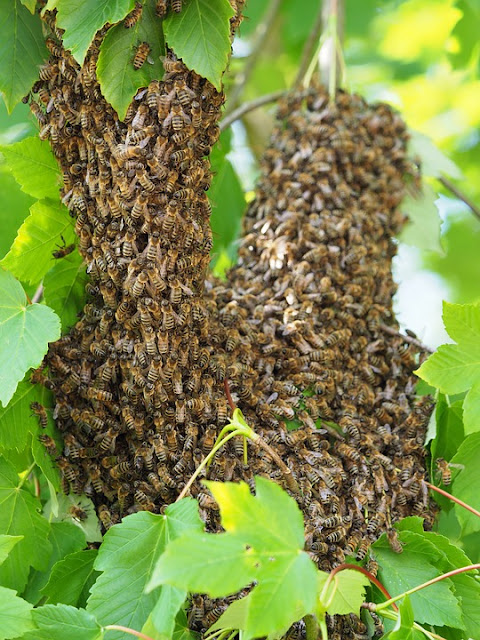Swarming
Now it's official swarm season, from April- September in the UK swarming is bound to happen in lots of hives.
A swarm is the way honey bees reproduce, the queen leaves with around 60% of the bees in the hive and seeks out a new home. If you are lucky you may see a swarm, it's like cloud of bees in the sky- they look scary but are in fact rather harmless. Swarms tend to cluster on a tree branch or similar (or indeed somewhere obscure) for a rest and to send out scout bees to find a suitable home, they look like a big ball of bees at this stage. If you see a clustered swarm you should try and contact a local beekeeper using the BBKA swarm page or your local association. Swarms left can either die, end up spreading disease or often set up home in a chimney!
In the old hive they leave behind the nurse bees, the brood and queen cells. These queen cells contain virgin queens who will hatch and potentially swarm again if there is more than one queen cell left behind (I found 17 in one hive last year). This virgin queen will then mate and start laying and everything is back to normal (hopefully!) Effectively they've split themselves into two colonies.
Now swarming is natural instinct in bees, for a long time I thought you were a bad beekeeper if your bees swarmed but I've learnt sometimes there is nothing you can do, you might miss a queen cell on an inspection or time is not on your side and you miss an inspection. You don't want to actively create swarms as they take with them a lot of honey and a lot of bee! You should inspect your hives weekly looking for signs of swarming-these can be queen cups (the beginning of queen cells), overcrowding in the brood box, the queen laying less and they begin to slim her down so she can fly. If you spot these signs you need to act quickly. As soon as queen cells are capped it's probably too late and they are ready to swarm. You can split the colony through making a nuc, artificial swarms or demarees.
I had a broken foot one year and my dad was working this lead to use losing a lot of bees to a swarm. last year our bees had plans very different to ours. We did a split which was unsuccessful, our queens didn't mate, one queen went on a mating flight then decided to come back and set up home under the hive (quite frankly it was a disaster) so this year we're determined to get on top of it and not have a repeat of last year!
A swarm is the way honey bees reproduce, the queen leaves with around 60% of the bees in the hive and seeks out a new home. If you are lucky you may see a swarm, it's like cloud of bees in the sky- they look scary but are in fact rather harmless. Swarms tend to cluster on a tree branch or similar (or indeed somewhere obscure) for a rest and to send out scout bees to find a suitable home, they look like a big ball of bees at this stage. If you see a clustered swarm you should try and contact a local beekeeper using the BBKA swarm page or your local association. Swarms left can either die, end up spreading disease or often set up home in a chimney!
 |
| a swarm resting in a tree |
In the old hive they leave behind the nurse bees, the brood and queen cells. These queen cells contain virgin queens who will hatch and potentially swarm again if there is more than one queen cell left behind (I found 17 in one hive last year). This virgin queen will then mate and start laying and everything is back to normal (hopefully!) Effectively they've split themselves into two colonies.
Now swarming is natural instinct in bees, for a long time I thought you were a bad beekeeper if your bees swarmed but I've learnt sometimes there is nothing you can do, you might miss a queen cell on an inspection or time is not on your side and you miss an inspection. You don't want to actively create swarms as they take with them a lot of honey and a lot of bee! You should inspect your hives weekly looking for signs of swarming-these can be queen cups (the beginning of queen cells), overcrowding in the brood box, the queen laying less and they begin to slim her down so she can fly. If you spot these signs you need to act quickly. As soon as queen cells are capped it's probably too late and they are ready to swarm. You can split the colony through making a nuc, artificial swarms or demarees.
I had a broken foot one year and my dad was working this lead to use losing a lot of bees to a swarm. last year our bees had plans very different to ours. We did a split which was unsuccessful, our queens didn't mate, one queen went on a mating flight then decided to come back and set up home under the hive (quite frankly it was a disaster) so this year we're determined to get on top of it and not have a repeat of last year!


Comments
Post a Comment